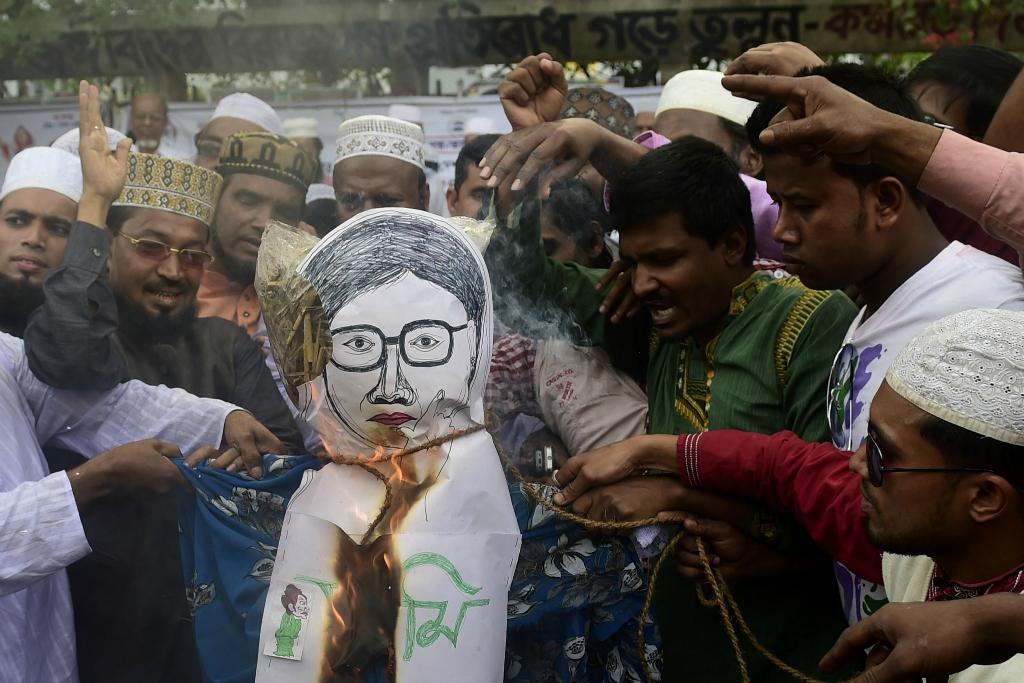Political deadlock, violence put Bangladesh on the brink of civil war
Activists from the Awami Olama League burn an effigy of Khaleda Zia, the leader of the Bangladesh Nationalist Party (BNP). They are protesting an ongoing nationwide strike and blockade called by the BNP. The violence has reportedly left 80 people dead.
BONN, Germany — Bangladesh’s two main political parties have been deadlocked since the controversial general elections over one year ago. Political violence has now taken a turn for the worse as casualties continue to rise, throwing the country further off the democratic path.
The escalation began when Khaleda Zia, leader of the country’s largest opposition party, the Bangladesh Nationalist Party (BNP), was confined to her office on January 3. Zia called for a protest on January 5, which her party dubbed ‘Democracy Killing Day’, to mark the first anniversary of Prime Minister Sheikh Hasina’s victory in the controversial 2014 general elections. Hasina’s Awami League (AL) party had won by a landslide after the BNP boycotted the elections in the belief that they would be rigged.
Human Rights Watch recently noted that the current cycle of violence, which now also includes deadly arson attacks, is following the same pattern it documented a year ago when 500 people were killed in election-related violence. Since the protests turned violent this year, hundreds have been injured and at least 60 people have been killed.
Known as the “battling begums of Bangladesh," Sheikh Hasina and Khaleda Zia both hail from powerful political families and have taken turns ruling the country for nearly 22 years. Hasina’s father, Sheikh Mujibur Rahman, was the founder and first president of Bangladesh. He was assassinated by a group of military officers and soldiers in 1975. A few years later in 1981, Zia’s husband Ziaur Rahman was assassinated during his term as president. According to popular belief in Bangladesh, each woman suspects the other played a role in the assassination.
The Bertelsmann Stiftung’s Transformation Index (BTI) — which analyzes transformation processes towards democracy and a market economy in 129 developing and transition countries — points out in its Bangladesh report that the conflict has inhibited the process of institutionalizing civilian control over the armed forces: “As civilian leaders (Hasina and Zia) have sought to instrumentalize the military for their partisan interests, they have avoided institutionalizing civilian control in favor of an informal, personalized style of instructing and monitoring the armed forces. This political polarization has led to politicization of other institutions such as the judiciary and bureaucracy,” write the experts.
In this war of titans, wresting the seat of power in Bangladesh has become a game of thrones. The victim is the country’s people, whose national interests have been sidelined because of the personal animosity between the begums. Business leaders, for instance, came together recently to protest in the capital, Dhaka, declaring that the transport blockade and strikes that Zia called in January have led to an estimated loss of $10 billion so far. Public life has ground to a standstill as angry mobs hurl Molotov cocktails and burn down buses to force the blockade.
In an effort to bring back order to the country, Hasina’s government has cracked down on the opposition by jailing thousands of BNP supporters and shutting media outlets that voice criticism. On the streets, however, the unrest has continued unchecked, injuring hundreds. Journalists report that hospital burn wards are overflowing.
As the BTI report suggests, it is critical that urgent efforts are undertaken to develop a national consensus around economic objectives, processes of political succession, and institutional arrangements for democratic practices.
A plausible third party has never really emerged in this South Asian nation that has long been rife with dynastic politics. While in office, both of the begums have made several attempts to monopolize political power by marginalizing the other.
The BTI report cites an inability to prioritize issues and devise strategies for change as the key weaknesses of Bangladesh’s political parties and civil administration: “Most policies adopted are done so with the next election in mind and are therefore short-term oriented in terms of priorities.”
Change is long overdue, but a scenario where Zia and Hasina put aside their personal differences and sit down for a dialogue is quite unlikely given their history. A more likely scenario is that the country will be thrown further off the democratic course, making itself vulnerable to the threat of a civil war.
Roma Rajpal Weiss is a freelance journalist and blogger from India, currently based in Bonn, Germany. She may be followed on Twitter @romarajpal.
Every day, reporters and producers at The World are hard at work bringing you human-centered news from across the globe. But we can’t do it without you. We need your support to ensure we can continue this work for another year.
Make a gift today, and you’ll help us unlock a matching gift of $67,000!
